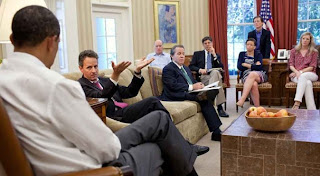And now, the hard part.
Now that President Obama has been reelected for a second term, the showdown with Congress over the fiscal cliff awaits. He must also tackle immigration reform, a topic he’s been criticized for not pushing harder during his first term, and work toward promises about jobs and the economy made during the campaign.
6
Comments
Leading for Change
For Obama, where has Lincoln gone?

For all the talk about his interest in history, Obama has so far failed to draw on the most salient leadership lessons of his predecessors.
A tale of two Obama victory speeches

To compare the two speeches is to see a leader who has learned much about how divided the country stands and how difficult change can be.
What makes an excellent president

The author of The President as Leader talks about the four leadership qualities that define excellence in the White House.
Of course, picking the right advisers is paramount for any leader putting together a new team, and a changing of the guard is normal for any two-term president. But it’s especially critical for this one. Obama’s team has been relatively stable during his first term, with 13 of the 15 department secretaries staying the full four years, meaning a significant injection of new blood will be even more disruptive—in good ways and bad—than had turnover trickled throughout his first term.
Second, he has been repeatedly criticized for having an insular group of advisers. Whether they were seen as too Clinton or too Chicago, the president’s inner circle has taken plenty of hits for being closed off. Expanding the group of people who advise him will be particularly important as reelection ceases to be a priority and cementing a legacy of accomplishment—something that will require more bipartisan cooperation—steps up.
Finally, a new team may be the president’s single strongest weapon against the dreaded “second-term curse.” Widely acknowledged by historians and political pundits, it refers to the tendency for a president’s second term to be less effective, more scandal ridden and increasingly failure ridden than the first. As the New York Times highlights, second terms have been damaging for many, if not most, two-term commanders in chief. FDR had his Supreme Court packing scandal. Reagan had the Iran-contra affair. And Bill Clinton had Monica Lewinsky.
Scholars point to a number of reasons for the curse, from overconfidence following a second victory (especially in cases of landslides) to the actions of upcoming successors, either from within the president’s own party or the opposition. Yet another reason, Brookings Institution scholar Stephen Hess tells the Times, is that presidents pick the best staff or cabinet members for their first term, leaving less capable people to fill their jobs after they move on.
I don’t believe there’s a dearth of capable people out there to fill the shoes of those who’ll be moving on from the White House. It feels like quite a limited view to think only a small group of 15 or so people are that competent. What’s more, the so-called “best advisers” who may be on their way out no longer have something the outsiders do—fresh eyes, new blood and distance from the overconfidence and hubris that could lead an Obama administration to falling for the second-term curse.
Jena McGregor is a columnist for the Washington Post’s
More from On Leadership:
A tale of two Obama victory speeches
What makes an excellent president
With Elizabeth Warren’s Senate win and others, a new Year of the Woman?







